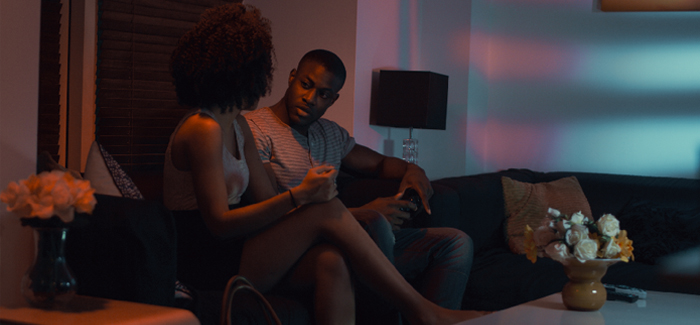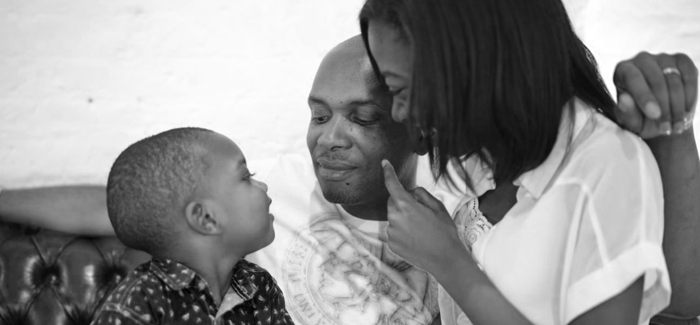Life of Hers is one of the many new drama series seeking to explore the ‘Sex & The City’ of millennial women. But unlike Lena Dunham’s award-winning HBO drama Girls, or MTV’s Underemployed, it explores this experience through the eyes of four daughters of the African diaspora.
Set in London, the web series is written by Samantha Chioma, and directed by Olan Collardy and Ola Masha of Cardy Films UK. It is one of the most recent examples of how the lack of credible representation of ethnic groups in UK creative industries is less about talent, and more a question of creating spaces for this talent to thrive- especially financially. The pilot webisode ,which debuted on Friday, was shown via the Cardy Films TV YouTube Channel where you can now watch the entire first season.
Here, Life of Hers creator Samantha Chioma shares what inspired the ups and downs of these London women, a frank response to recent debates about diversity in UK broadcast media, and more.
Domalene: What should we expect from the series? Watching the Life of Hers trailer, I noticed that the cast and crew highlight the non-stereotypical black characters and universal appeal of the script as refreshing and eagerly welcomed…
Samantha Chioma: Yes, I think that may have been what attracted the cast and crew to the project in the first place – that it is a realistic drama with characters, relationships and storylines that are familiar and complex and layered. People should expect to be entertained and they should also, hopefully, see things in the characters’ lives to which they can relate.
Did you have an idea of the film team you wanted to work with, or was it more of “hunt and gather” process?
SC: I had the idea for a series a while ago, and then sent a brainstorm of ideas to friends Waiki Harnais and Ola Masha (who are two-thirds of the Cardy Films team) for their opinion. Some months later, Olan Collardy, the Director of Photography and Executive Producer of Life of Hers (also a good friend, and the final third of Cardy Films), called me and told me I had to write the script as soon as possible, as he wanted to get it produced. I’m not entirely sure the sequence of events after that, but he, Ola and Waiki then did the work of getting the rest of the production team together and then filming and editing everything.
Why do you trust the Life of Hers production team with your script?
SC: The Life of Hers production team, Cardy Films, are brilliant, creatively and technically, and their catalogue of short films exemplifies this. I’ve been a fan of their work since they started working together and I love their vision and approach, so I knew they would just ‘get it’. And they did – they understood the importance of this project to me and could see exactly what I was trying to do with it, so ‘trust’ was never an issue.
Why call the series “Life of Hers”?
SC: Deciding on the title ‘Life of Hers’ was actually a laborious process! Whenever I write, I usually think of the title first and then write to that. It helps me define the concept and acts as a reminder of the point of the article (I rarely write plans, unfortunately). This time, however, I was doing it ‘backwards’ and writing with the concept but without a title. For months we had only a working title that I wasn’t happy with, but I found it difficult thinking of anything else that would accurately reflect the series. In an email brainstorming conversation with the production team, I think it was the director Ola who came up with the title ‘Life of Hers’, and it was perfect. It reflects the fact that this series is not only about four women, but is about any woman who is able to relate to the characters’ lives, relationships, conflicts and experiences.
What motivated you to launch this series?
SC: It was the type of show that I wanted to watch myself. I love writing (and reading) realistic fiction, as I am fascinated by the complexities of the lives of ‘normal’ people, and the concept I had for Life of Hers was not something I had yet seen on TV. I felt that it could really serve to document and explore different aspects of life as a black British woman in the 2000s.
Why did you choose to create four cosmopolitan female characters with parents who migrated to London from the African continent?
SC: Because it’s my story, it’s the story of my friends; it’s the story of so many of us! As much as we share similar experiences, the African experience in London is very different to the Caribbean experience in London, for example, and coming from an African background, I really wanted to shed some light on this, as the black British African experience is not one that I feel gets much attention or exploration beyond the typical caricatures or stereotypes. And even then as Africans in London, although we do share an interesting history and hybrid culture, between us our stories are so different. Those whose parents come from Nigeria will have a different story to those who come from Somalia or Congo or Zimbabwe. And the distinctions go further than that, into ethnicities and class and languages and towns and families! But the things that unify us are our blackness and the fact that we are Londoners. And I really wanted to explore those complexities in the context of being a young woman trying to navigate life and relationships.
Will you be introducing characters from other regions of the diaspora?
SC: In this season, or in the next one? For season two I really want to work on developing the characters more, exploring more of the characters’ back stories and motivations. There’s no plan as yet to introduce more key characters from other regions of the diaspora, however, I am really interested in black British Caribbean experiences as well, so who knows!
What are your thoughts on the Black acting talent migration to the USA as well as Lenny Henry’s efforts to address the issue?
SC: It’s a real issue across many creative sectors, I’m sure, but for black actors it’s understandable if some they might find more success – more paid role opportunities – across the Pond than they will here. And it’s not just any type of role; many black actors are also looking for nuanced, complex, well-developed and well-thought out characters to play – where are those opportunities here? Lenny Henry raises some salient points, in that change needs to happen at the top, where it’s decided whose stories are told and how, rather than pouring money into ‘developing’ talent. We’ve seen from the numerous web series and black productions (including theatre) that we already have the talent and the skill here. The opportunities, however, are limited.
I think it’s also important to note that actors are not just sitting and waiting to be called for a job on the BBC or other British channels and programmes – they are out there, writing and producing their own stuff and creating and demanding spaces for themselves and doing it brilliantly, for example, Anthony and Marlene Abuah of Tales from the Motherland Productions and Arinze Kene, an actor and playwright who was previously on Eastenders. What may be more advantageous is if there was more funding for black production teams that are already out there making feature films, short films and TV/web series. Hopefully the proliferation and popularity of these web series will eventually lead to actors getting paid their worth, so that we can collectively continue telling our own stories.
Why did you choose to write a series of webisodes, rather than a full length film?
SC: When you haven’t got a story with a distinct beginning, middle and end, a full-length film doesn’t really present as an option. Webisodes allow a lot more flexibility and space to weave multiple storylines that start and end at different times without confusing the viewer (or yourself!), and this really suits the concept of Life of Hers.
Which character is most likely to be your best friend?
SC: That’s an interesting question! I think it would probably be between Kaima and Cassandra. Although Kaima is the person that everyone goes to when they’re at their wits end and need emotional support, Cassandra is the person that’s always there in the background, doing the favours for people that are time-consuming and not-so-glamorous. She’s kind, generous and funny and despite having a more privileged background, she’s very humble and makes people feel at ease.
How has the response to the Life of Hers been so far?
SC: The response and support has been so amazing, really overwhelming. I’m really grateful for everyone that has been sharing the links to our promotional videos on social media and speaking so positively about it, even though they don’t know us and the show hasn’t even aired yet! I’ve even received really encouraging emails thanking me for bringing to the screen something that they ‘know’ they’ll be able to relate to, something that will reflect their lives. That’s really something. I do hope they’ll still feel the same way when they actually get to watch the series(!)
What tips would you give for developing a successful film project?
SC: I’m not sure I’m the best person to answer this question! But I would say two things that I’ve learnt along the way: write the story that is important to you and never underestimate the value of a good team, particularly a team that adopts your vision as their own.
Our favourite episode will be…
SC: Good question! I think, maybe episode three. A few things come to a head in that episode and there are a couple of ultimatums. However, I’d be interested to hear your answer to this question when you get to watch it!






![[VIDEO] #DTRT25: LONDON CELEBRATES SPIKE LEE’S ‘DO THE RIGHT THING’](https://www.thenublk.com/wp-content/uploads/2014/07/DTRT25-CHALK_FI.jpg)